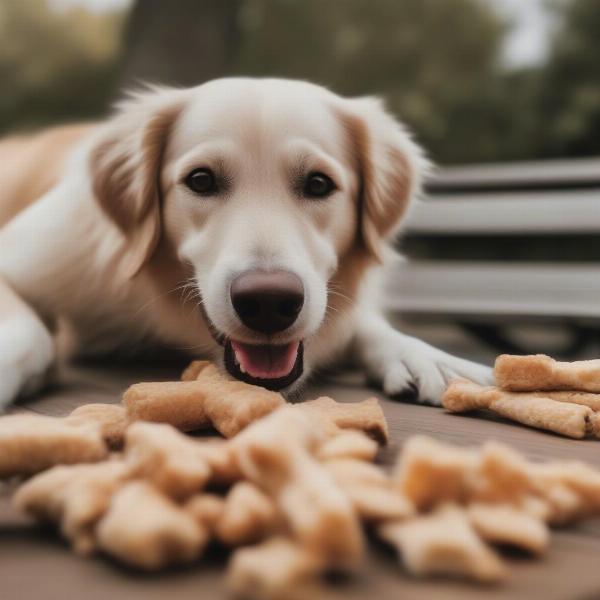The term “corn dog pogo” might conjure up images of a fun, on-a-stick treat, but when it comes to our canine companions, it’s crucial to remember that human snacks aren’t always suitable for them. While the name might sound playful, feeding your dog a corn dog (or anything resembling a pogo stick!) could lead to some serious health issues. This article will explore why corn dogs are not recommended for dogs and offer healthier, dog-friendly alternatives to satisfy your furry friend’s cravings.
Corn dogs, those deep-fried delights often enjoyed at fairs and carnivals, are a tempting treat for humans, but they pose several risks to our four-legged friends. The high fat content can lead to pancreatitis, a painful and potentially life-threatening inflammation of the pancreas. The processed meat in corn dogs is typically high in sodium, which can cause dehydration and other health problems. Additionally, the cornbread batter itself, often containing sugar and other additives, isn’t easily digestible for dogs and can contribute to weight gain and digestive upset. Finally, the stick itself presents a choking hazard.
Why Corn Dogs Are a No-Go for Your Dog
So, what exactly makes corn dogs so unsuitable for canine consumption? Let’s break down the dangers:
-
High Fat Content: The deep-fried nature of corn dogs results in a high fat content, which can disrupt a dog’s digestive system and potentially lead to pancreatitis. Pancreatitis symptoms include vomiting, diarrhea, lethargy, and abdominal pain.
-
Excessive Sodium: Processed meats, a key ingredient in corn dogs, are often loaded with sodium. Excessive sodium intake in dogs can lead to dehydration, increased thirst, and even sodium ion poisoning in severe cases.
-
Sugary and Processed Ingredients: The cornbread batter often contains sugar and other additives that are not beneficial for dogs. These ingredients can contribute to weight gain, dental problems, and digestive issues.
-
Choking Hazard: The stick in a corn dog presents a significant choking hazard for dogs. If swallowed, it can cause blockages or internal injuries.
Healthy Alternatives to Corn Dogs for Your Furry Friend
Don’t worry, there are plenty of healthy and delicious alternatives you can offer your dog instead of corn dogs! Consider these options:
-
Dog-Specific Treats: Numerous commercially available dog treats are formulated with your dog’s nutritional needs in mind. Look for treats made with natural ingredients and avoid those with excessive sugar or artificial additives.
-
Fresh Fruits and Vegetables: Certain fruits and vegetables, like carrots, apples (without the core and seeds), and blueberries, can make healthy and enjoyable snacks for your dog. Always ensure they are cut into bite-sized pieces to prevent choking.
-
Homemade Dog Treats: Baking homemade dog treats allows you to control the ingredients and tailor them to your dog’s specific dietary needs. There are countless recipes available online using dog-friendly ingredients like peanut butter, bananas, and oats.
What to Do if Your Dog Eats a Corn Dog
If your dog manages to snag a bite of a corn dog, monitor them closely for any signs of distress, such as vomiting, diarrhea, or lethargy. If you observe any of these symptoms, contact your veterinarian immediately.
 Dog Eating Healthy Treats
Dog Eating Healthy Treats
Conclusion
While the name “corn dog pogo” may sound amusing, it’s essential to remember that human snacks are not always suitable for our canine companions. Corn dogs pose several health risks to dogs, including pancreatitis, sodium poisoning, and digestive upset. Opt for healthier alternatives like dog-specific treats, fresh fruits and vegetables, or homemade dog treats to keep your furry friend happy and healthy.
FAQ
-
Can dogs eat cornbread without the hot dog? While plain cornbread isn’t as harmful as a full corn dog, it still isn’t ideal for dogs due to its high carbohydrate content and potential for containing sugar and other additives.
-
What are the signs of pancreatitis in dogs? Common signs include vomiting, diarrhea, lethargy, loss of appetite, abdominal pain, and fever.
-
What should I do if my dog eats something it shouldn’t? Contact your veterinarian immediately for advice.
-
Are there any human foods that are safe for dogs? Yes, some human foods, like cooked chicken, plain rice, and certain fruits and vegetables, can be given to dogs in moderation. Always research before giving your dog any human food.
-
What are some good sources for homemade dog treat recipes? You can find numerous recipes online on reputable websites and blogs dedicated to pet health and nutrition.
ILM Dog is your go-to resource for expert advice on all aspects of dog care and wellbeing. From breed selection and health to training, nutrition, and grooming, we provide comprehensive information to help you provide the best possible care for your furry companion. We also offer a wide range of high-quality products and accessories to meet your dog’s needs. Contact us today at [email protected] or +44 20-3965-8624 for personalized guidance. Visit ILM Dog for more information and resources.